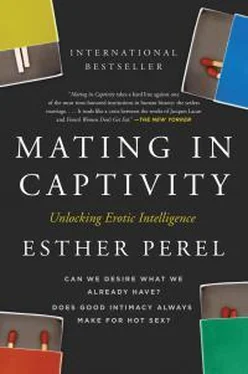At our next session, Ryan knows exactly where he wants to start. Earlier that week, Christine and Barbara had made plans to go out to dinner. Feeling guilty, as she usually does, about going out without him, Christine invited Ryan to come along. Then she proceeded to ignore him for the rest of the evening. For once, he didn’t mind taking a backseat as he watched the women reminisce. After college they had both spent a year in Togo with the Peace Corps. Christine came home; Barbara never did. As was often the case in their conversations, each reported her envy of and admiration for the life of the other.
“We’d just finished a great bottle of Australian Shiraz,” said Ryan, “and we were all pretty tipsy, when Christine totally shocked me by blurting out to Barbara, ‘I look at you and I wonder if it’s worth it. Frankly, I don’t think I’m made for this—the kids, the house, the job. Sometimes I wonder if I did it just to prove I could.’ Then she says, ‘I find it all so oppressive.’ She wondered if it was all worth it—she finds it oppressive? I was stunned.” Ryan repeated these words in a dazed voice as if he still couldn’t quite believe hearing them. At my prodding, he told me the rest of his wife’s remarks—that she felt she had always just done what was expected of her, that this was easier than figuring things out on her own. He continued, his tone both mocking and full of admiration as he expertly mimicked his wife. “‘I know it’s not right to complain when you have it all,’ she says. ‘Where’s my gratitude? I’m blessed with the kids, with Ryan, the remnants of a decent career, good friends. When you don’t have it—the family, the marriage—you romanticize it. At least I did. But then when you do have it, you feel trapped. I have my blissful moments, but mostly I’m mired in drudgery.’”
Ryan said nothing at the time, but he was shocked. “How was I supposed to know she felt that way? She always looked happy enough to me. I thought she had what she wanted. I thought I was the only one feeling restless.” Now, he was divided. On one hand he was angry that she hadn’t lived up to his expectations; on the other, he was anxious about what her polemic said about him. “In my mind, she’s a rock, I’m the squirmy one. I’ve had to work hard at being who I thought she wanted me to be, creating this life together. I felt put down. If she feels trapped, mired in drudgery, what does that make me?”
“Do you need her to acknowledge your hard work?” I asked.
“I guess so. Somehow her doubts diminished the value of my efforts. But then, this weird thing happened.” He paused before speaking again. “I started to like it.”
“Explain,” I said.
“It’s like I did a complete 180. I couldn’t interrupt her, which I probably would have done if we’d been alone—not that she would ever say this stuff to me, anyway. Besides, I was intrigued. She felt just like I did; she was saying the very same things I didn’t dare say. She wanted more. She was hungry, too. She missed her freedom. She kept becoming more interesting to me, more foreign. The wine really loosened her tongue.”
“What else did she say?” I, too, was curious. The actor in him couldn’t resist playing her part.
“‘ I feel like we’re just stuck together,’” he said, again imitating her voice. “‘Sometimes I fantasize about other lives, other men. Not any one man in particular—I just imagine a clean slate, unencumbered, no history, no problems. Someone I could be different with. I get so resentful that I am stuck in this house, in this family, inside my body. All I want to say is leave me alone, don’t bother me.’”
Ryan shared with me the unexpected denouement of the evening. “I started out shocked and then defensive and then angry. But, weirdly, the more she was going on and on, the more I wanted her. She was on fire. At first I thought, oh, just quit the diatribe; but then I was captivated by her, I identified with her, and in a strange way I felt closer to her and more turned on than I had in a long time. My fascination with Barbara vanished. And I knew that if I’d married Barbara I’d be longing for Christine.”
“And you didn’t have to work for it,” I say. “I couldn’t have sent you home with an assignment that would have had this kind of result.” I explain to him that his renewed desire came from her reassertion of her separateness and her dreams. When she voiced her unrequited longings, she gave Ryan permission to unleash his.
It’s all highly impractical sometimes. The same scenario with a different couple might have triggered a fear of abandonment that would have caused the fight of the century. Nobody can plan for this; that’s the point. Desire is an enigma; it’s insubordinate, and it chafes at impositions. That evening, Ryan was receptive to Christine. In her honesty, he discovered her again. Even more important, he was choosing her again, and it’s the act of choosing, the freedom involved in choosing, that keeps a relationship alive.
The flambé that Ryan and Christine savored that night had nothing efficient or expedient to it. It wasn’t a task they could incorporate into their weekly routine. Christine rattled the cage, and Ryan was dislodged. She claimed her individuality, and the end result was greater intimacy. Desire emerged from a paradox: mutually recognizing the limitations of married life created a bond between them; acknowledging otherness inspired closeness.
There is no way to “institutionalize” or create a personal marital policy for this couple that will somehow ensure that they will go on having, or ever again have, this experience. As a therapist I acknowledge that setting up some kind of programmatic reinforcement to help them maintain this newfound glow is beyond my ability. But even though I can’t turn this into an assignment or exercise, the fact that it happened may wake them up to a different kind of reality. It’s my hope that it will change the way they look at themselves and each other.
“A Paradox to Manage, Not a Problem to Solve”
What makes sustaining desire over time so difficult is that it requires reconciling two opposing forces: freedom and commitment. So it’s not only a psychological or practical problem; it’s also a systemic one. That makes it harder to “work at.” It belongs to the category of existential dilemmas that are as unsolvable as they are unavoidable. Ironically, even the business world, which is all about pragmatism and effectiveness, recognizes that some problems do not have clear solutions.
We find the same polarities in every system: stability and change, passion and reason, personal interest and collective well-being, action and reflection (to name but a few). These tensions exist in individuals, in couples, and in large organizations. They express dynamics that are part of the very nature of reality. Barry Johnson, an expert on leadership who is the author of Polarity Management: Identifying and Managing Unsolvable Problems , describes polarities as sets of interdependent opposites that belong to the same whole—you can’t choose one over the other; the system needs both to survive.
Ben, for example, has a new girlfriend every six months, and each time he’s convinced he’s found “the one.” But when the erotic intensity wanes even slightly, he panics and bails, thinking, “It’s all downhill from here. I guess it wasn’t love after all.” He talks a lot about wanting a stable relationship—he wants commitment, he’s ready to pair up—but his tolerance for sexual ennui is nil. In Ben’s experience, commitment and excitement are mutually exclusive.
But in his fantasy, there is an omnipotent woman out there who can make it all come together. Her enchanting powers will ensure that the sex remains vibrant—the clearest sign of enduring love. She will be a woman who is so extraordinary, so amazing, that her sheer perfection will induce him to want to settle down (as if all this has nothing to do with him). Invariably, her unavailability is her single most attractive feature. He’s been saying the same thing for years, “I just haven’t found the right person yet. I’ve met loads of women. I just haven’t met the right one, the one I could really stay with. I ask my friends who they would set me up with, and they can’t think of anyone either. So you see?” Ben is in perpetual search for the ideal woman. Of course, he’s been looking for a long time: even the most idealized creature ultimately turns out to be merely human, and therefore flawed.
Читать дальше










